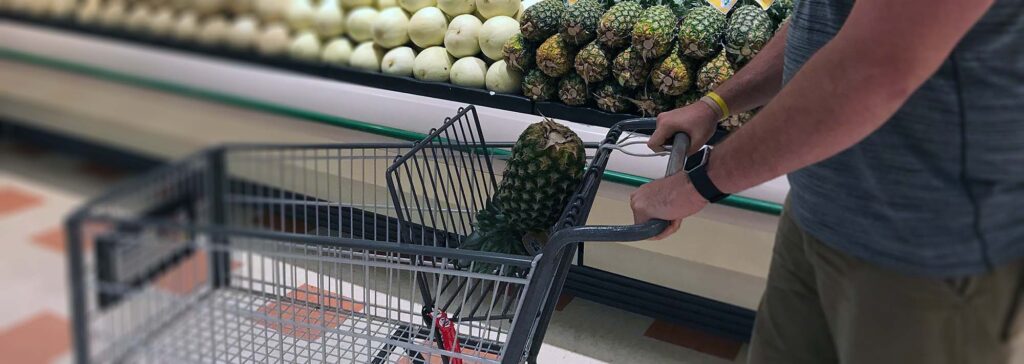Table of Contents
A Fruitful Encounter: The Swingers Code and Its Surprising Supermarket Revelations
At first glance, the simple act of placing an upside-down pineapple in a shopping basket seems rather innocuous. However, for those in the know, this seemingly ordinary act has a hidden meaning that has led to some intriguing encounters and conversations in supermarket aisles across the UK. The upside-down pineapple is not merely a tropical fruit, but a symbol that has been adopted by the “swingers” community – those who engage in consensual, non-monogamous relationships – as a code to discreetly signal their lifestyle.
Delving into the History of the Swingers Code
From Key Parties to Fruit Displays
The concept of a “swingers code” dates back to the 1970s in the United States, when it was alleged that suburban couples would host so-called “key parties.” At these gatherings, men would place their car keys into a bowl upon arrival, and at the end of the night, women would randomly select a set of keys, thus determining who their partner would be for the evening.
Though the veracity of these key parties has been called into question, the notion of using discrete symbols to signal one’s involvement in the swinging lifestyle has persisted. Over time, the symbol has evolved from car keys to other tokens, and the upside-down pineapple has emerged as the preferred emblem for many swingers in the UK.
Why the Upside-Down Pineapple?
A Tantalising Tropical Treat
There is no definitive answer as to why the pineapple has become the fruit of choice for this code, but some theories suggest that its exotic and luxurious associations have played a part. In the 18th century, pineapples were seen as a status symbol in Britain due to their rarity and cost, and they were often displayed at lavish feasts to impress guests.
Today, the pineapple continues to be a popular choice for home decor, with pineapple-themed objects such as lamps, cushions, and wallpaper adding a touch of whimsy to interior design. It is perhaps this playful, slightly mischievous quality that has led to the pineapple becoming a symbol of the swinging lifestyle.
The Art of Subtle Signalling
When it comes to the upside-down pineapple, its appeal as a code lies in its subtlety. It is a symbol that can easily be dismissed as a harmless, albeit unusual, way of carrying a fruit. This allows swingers to signal their preferences without fear of judgment or intrusion from those who may not be part of their community.
Interesting Encounters in the Supermarket Aisle
When Pineapples Bring People Together
For those who recognise the code, the sight of an upside-down pineapple in a shopping basket can spark curiosity and intrigue. Many have reported that these encounters have led to fascinating conversations with fellow shoppers, as they navigate the delicate balance between acknowledging the code and maintaining discretion.

In some instances, these supermarket meetings have even led to the formation of new friendships and connections within the swinging community. This highlights the power of the pineapple as more than just a symbol; it is a tool that enables like-minded individuals to find each other in the most unexpected of places.
A Double-Edged Sword
However, the use of the pineapple code is not without its challenges. While it may provide
a discreet means of communication, there is always the risk of misunderstanding or misinterpretation. For those who are not familiar with the swinging lifestyle or the significance of the upside-down pineapple, these encounters can lead to confusion or even embarrassment.
On the other hand, some swingers have reported that the code has been inadvertently decoded by individuals who were not part of the community but simply curious about the peculiar arrangement of fruit in someone’s shopping basket. This can lead to awkward conversations and explanations, as well as the potential for judgment or disapproval from onlookers.
Embracing the Pineapple and Its Symbolism
A Personal Choice
Ultimately, the decision to incorporate the upside-down pineapple into one’s shopping basket is a personal choice. For some, it serves as a bold statement of their identity and preferences, while for others, it may simply be a playful way to engage with fellow members of the swinging community.
As with any form of non-verbal communication, there is always the risk of misinterpretation or miscommunication. However, for many swingers, the benefits of using this subtle code outweigh the potential drawbacks, enabling them to forge connections and engage in open and honest conversations with like-minded individuals.
Breaking Down Barriers and Encouraging Dialogue
Despite the potential for misunderstandings and awkward encounters, the upside-down pineapple code has, in many ways, fostered a greater sense of community and camaraderie among swingers. By embracing this unspoken language, individuals can express their desires and preferences in a way that is both discreet and empowering.
Furthermore, these encounters can serve as a catalyst for open and honest conversations about the swinging lifestyle, breaking down misconceptions and encouraging greater understanding and acceptance of this often-misunderstood subculture.
Final Thoughts: The Power of a Pineapple
As we navigate the labyrinthine aisles of our local supermarkets, it is easy to become lost in the mundanity of everyday life. However, for some, the simple act of placing an upside-down pineapple in their shopping basket can transform a routine chore into an opportunity for connection, intrigue, and self-expression.
While the pineapple code may not be without its challenges, it serves as a reminder that even in the most ordinary of settings, there can be extraordinary stories waiting to be uncovered. So, the next time you find yourself wandering the fruit aisle, why not take a moment to consider the possibilities that lie hidden within an upside-down pineapple?
